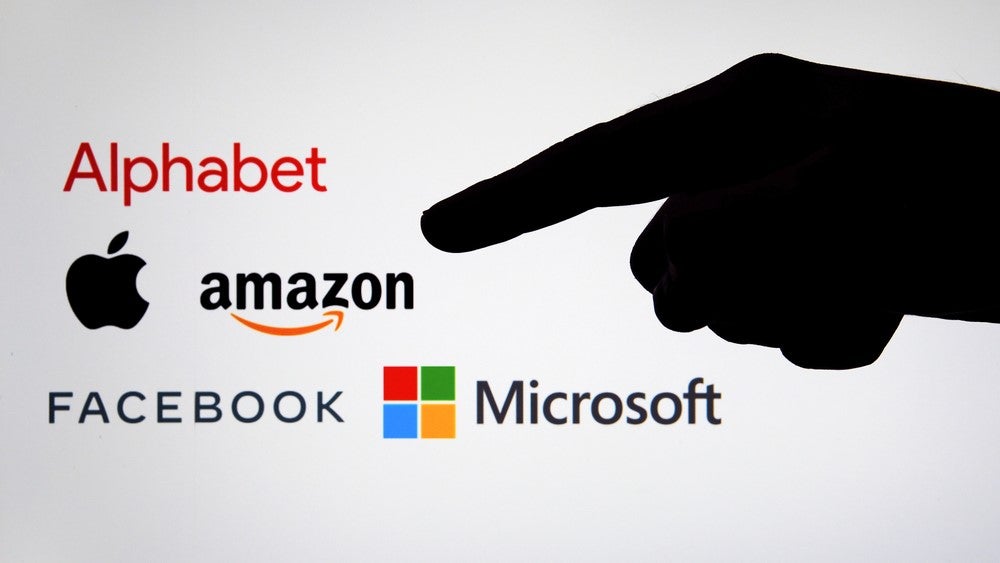
Big Tech’s M&A plans are facing a growing obstacle as various legislative proposals look set to change merger control and regulation in digital markets. The number of deals have decreased amongst the largest players, including Alphabet, Apple, Google, Meta and Microsoft, as regulators globally take a tougher stance.
A new report on Tech M&A Regulation notes the industry-wide decrease; considering the reasons behind it, it notes: “the total number of M&A deals in the TMT industry worldwide declined by 27% in 2023 compared to the previous year. High interest rates have hampered activity by driving up the cost of borrowing. Geopolitical tensions and regulatory scrutiny have also contributed to the M&A slowdown.”
GlobalData analysis of M&A deals completed by a selection of the major Big Tech players shows an overall decrease in the volume since 2020.
Across the technology sector, there has been a notable decrease in the volume and total value of M&A deals. GlobalData records revealed that there were 8,370 M&A deals completed in 2023, a significant decrease from the 11,752 in 2021.
The value also dropped, from $995 bn in 2021 to $387 bn in 2023, representing a 61% decrease over the period. Meta's total deal value alone dropped from $7.1 bn to $113 mn in this period.
Among other companies feeling the impact of regulatory scrutiny is ADOBE, which was forced to abandon its planned $20bn acquisition of Figma at the end of 2023, after encountering UK and EU regulator opposition. Similarly, in January 2024, EU scrutiny saw Amazon miss out on a potential acquisition, as its $1.7bn acquisition of iRobot collapsed.
How well do you really know your competitors?
Access the most comprehensive Company Profiles on the market, powered by GlobalData. Save hours of research. Gain competitive edge.

Thank you!
Your download email will arrive shortly
Not ready to buy yet? Download a free sample
We are confident about the unique quality of our Company Profiles. However, we want you to make the most beneficial decision for your business, so we offer a free sample that you can download by submitting the below form
By GlobalDataLaura Petrone, author of the new GlobalData report, explained how legislative changes are contributing to the crackdown: “Merger control legislation is undergoing some important changes, with regulators worldwide adopting a tougher stance on M&A enforcement. In the current landscape, the EU's Digital Markets Act will likely have a strong impact, especially on Big Tech companies. It is already applicable, and according to it, a so-called digital gatekeeper can never be sure of whether or not its M&A activity will be reviewed by the European Commission, even if the target is tiny.
“The UK, India and China are also considering more stringent obligations for large digital platforms’ M&A plans. These efforts will make it more difficult for Big Tech to get regulatory approval for further M&A activity and potentially lead to higher fines and compliance costs in the future.”
Artificial intelligence and hardware
The report identifies AI M&A deals as an area of particular interest to regulators, as innovation drives interest from Big Tech companies. The impact of closer scrutiny is already being felt by Microsoft, as UK and US regulators have begun examining its ties with OpenAI, looking to establish whether the partnership was “an acquisition of control”.
Considering this regulator interest in Microsoft’s AI M&A activity, the report notes that “all tech companies with plans to pump large sums of money into AI start-ups will watch closely this and other potential probes, as there is now a growing risk that this kind of investment might be prohibited by regulators.”
The report also warns that the biggest companies are likely to also be the biggest losers, naming Apple, Microsoft, Meta, Baidu, NVIDIA, Alibaba, Amazon, Alphabet, ASML and Huawei as companies likely struggle with increasing regulation in hardware.
Of the impact of these struggles on other competitors, Petrone commented: “In the hardware segment, regulators’ increased scrutiny over Apple and Microsoft’s M&A activity could give other prominent hardware vendors, such as Sony, Lenovo and LG Electronics, opportunities to strengthen their competitive position. Leading semiconductor companies like Intel and Nvidia will find it increasingly difficult to buy companies and increase their market share in strategic technologies like AI chips.”
She concluded by noting that “all the regulatory efforts to bring M&A activity under closer surveillance will add to the complexity of the merger clearance environment as getting a deal cleared will become increasingly difficult.
“Large digital platforms that are dominant in a given market and targeting competitors in adjacent markets will be the big losers, as regulators will scrutinise them most.”





